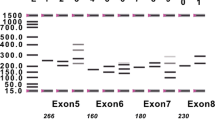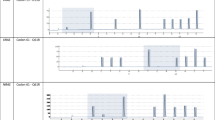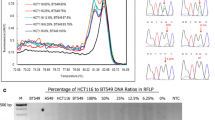Abstract
This case–control study investigated the mutations in p53 and k-ras genes of 123 gastric carcinoma patients and 129 normal individuals from Hunan, China. By isolating genomic DNA from peripheral blood and employing polymerase chain reaction–single strand conformation polymorphism and DNA sequencing, the mutations of p53 exons-5, 6, 7, and 8 and k-ras were detected. The overall mutation frequency of p53 was 29.3%, and mutation was found in all four exons studied. The point mutations were predominant and among them, G:C→A:T was the highest (41.7%), followed by A:T→G:C (25%), G:C→C:G (11.1%), G:C→T:A (8.3%), and A:T→T:A (2.8%). The frameshift mutation was 11.1%. Mutations were detected in codons-131, 132, 133, 135, 149, 151, 162, 167, 173, 174, and 175 of exon 5, codons-193, 197, 213, and 215 of exon 6, codons-245, 246, 248, 249, and 270 of exon 7, and codons-271, 272, 273, and 282 of exon 8 of p53. The overall frequency of mutation in k-ras was 9.8%, mostly in codon-12 (91.7%) and in codon-13 (8.3%). There was no significant relationship between p53 and k-ras gene mutation in gastric carcinoma patients. Also, the relationships between p53 mutation and age, sex, smoking or drinking, and tumor metastasis were not significant. However, the patients with high/high-middle differentiated gastric carcinoma had a higher association with of p53 mutations. This study identified some novel p53 mutations in gastric cancer and showed mutation pattern and frequency of p53 and k-ras in the population of the central southern region of China.
Similar content being viewed by others
References
Robins SL, Cotran RS. Neoplasia. In: Kumar V, Abbas AK, Fausto N, editors. Pathologic basis of disease. 7th ed. India: Thomson Press; 2009. p. 292–306.
Oliveira C, Seruca R, Carneiro F. Genetics, pathology, and clinics of familial gastric cancer. Int J Surg Pathol. 2006;14:21–33.
Gomez-Lazaro M, Fernandez-Gomez FJ, Jordán J. p53: twenty five years understanding the mechanism of genome protection. J Physiol Biochem. 2004;60:287–307.
Hollstein M, Sidransky D, Vogelstein B, et al. p53 mutations in human cancers. Science. 1991;253:49–53.
Sud R, Wells D, Talbot IC, et al. Genetic alterations in gastric cancers from British patients. Cancer Genet Cytogenet. 2001;126:111–9.
Belyavskaya VA, Vardosanidze VK, Smirnova OY, et al. Genetic status of p53 in stomach cancer: somatic mutations and polymorphism of codon 72. Bull Exp Biol Med. 2006;141:243–6.
Kranenburg O. The KRAS oncogene: past, present, and future. Biochim Biophys Acta. 2005;1756:81–2.
Arber N, Shapira I, Ratan J, et al. Activation of c-K-ras mutations in human gastrointestinal tumors. Gastroenterology. 2000;118:1045–50.
Shepherd T, Tolbert D, Benedetti J, et al. Alterations in exon 4 of the p53 gene in gastric carcinoma. Gastroenterology. 2000;118:1039–44.
Chung WC, Lee KM, Lee BI, et al. P53 genetic polymorphism of gastric cancer in Korea. Korean J Intern Med. 2006;21:28–32.
Yi SY, Lee WJ. A p53 genetic polymorphism of gastric cancer: difference between early gastric cancer and advanced gastric cancer. World J Gastroenterol. 2006;12:6536–9.
Cañas M, Morán Y, Camargo ME, et al. TP53 codon 72 polymorphism and gastric cancer risk: a case-control study in individuals from the central-western region of Venezuela. Invest Clin. 2009;50:153–61.
Mojtahedi Z, Haghshenas MR, Hosseini SV, et al. p 53 codon 72 polymorphism in stomach and colorectal adenocarcinomas in Iranian patients. Indian J Cancer. 2010;47:31–4.
Hamajima N, Matsuo K, Suzuki T, et al. No associations of p73 G4C14-to-A4T14 at exon 2 and p53 Arg72Pro polymorphisms with the risk of digestive tract cancers in Japanese. Cancer Lett. 2002;181:81–5.
Günther T, Schneider-Stock R, Häckel C, et al. Mdm2 gene amplification in gastric cancer correlation with expression of Mdm2 protein and p53 alterations. Mod Pathol. 2000;13:621–6.
Rugge M, Shiao YH, Busatto G, et al. The p53 gene in patients under the age of 40 with gastric cancer: mutation rates are low but are associated with a cardiac location. Mol Pathol. 2000;53:207–10.
Fukui H, Takada M, Chiba T, et al. Concurrent occurrence of gastric adenocarcinoma and duodenal neuroendocrine cell carcinoma: a composite tumour or collision tumours ? Gut. 2001;48:853–6.
Yanez L, Groffen J, Valenzuela DM. c-K-ras mutations in human carcinomas occur preferentially in codon 12. Oncogene. 1987;1:315–8.
Yang M, Guo Y, Zhang X, et al. Interaction of P53 Arg72Pro and MDM2 T309G polymorphisms and their associations with risk of gastric cardia cancer. Carcinogenesis. 2007;28:1996–2001.
Cao YY, Ge H, Chen LQ, et al. Correlation of 53BP1 and p53 polymorphisms to susceptibility to esophageal squamous cell carcinoma and gastric cardiac adenocarcinoma. Ai Zheng. 2007;26:1052–7.
Huang ZH, Hua D, Du X. Polymorphisms in p53, GSTP1 and XRCC1 predict relapse and survival of gastric cancer patients treated with oxaliplatin-based adjuvant chemotherapy. Cancer Chemother Pharmacol. 2009;64:1001–7.
Davis LG, Dibner MD, Battey JF. Preparation of DNA from eukaryotic cells. In: Davis LG, Dibner MD, Battey JF, editors. Basic methods in molecular biology. New York: Elsevier; 1986. p. 42–50.
van Oijen MG, Slootweg PJ. Gain-of-function mutations in the tumor suppressor gene p53. Clin Cancer Res. 2000;6:2138–45.
Maekawa M, Nagaoka T, Taniguchi T, et al. Three-dimensional microarray compared with PCR-single-strand conformation polymorphism analysis/DNA sequencing for mutation analysis of K-ras codons 12 and 13. Clin Chem. 2004;50:1322–7.
Hongyo T, Buzard GS, Palli D, et al. Mutations of the K-ras and p53 genes in gastric adenocarcinomas from a high-incidence region around Florence, Italy. Cancer Res. 1995;55:2665–72.
Karim S, Ali A. Correlation of p53 over-expression and lteration in p53 gene detected by polymerase chain reaction-single strand conformation polymorphism in adenocarcinoma of gastric cancer patients from India. World J Gastroenterol. 2009;15:1381–7.
Yokozaki H, Yasui W, Tahara E. Genetic and epigenetic changes in stomach cancer. Int Rev Cytol. 2001;204:49–95.
Finkelstein SD, Sayegh R, Christensen S, et al. Genotypic classification of colorectal adenocarcinoma. Biologic behavior correlates with K-ras-2 mutation type. Cancer. 1993;71:3827–38.
Cerottini JP, Caplin S, Saraga E, et al. The type of K-ras mutation determines prognosis in colorectal cancer. Am J Surg. 1998;175:198–202.
Al-Mulla F, Going JJ, Sowden ET, et al. Heterogeneity of mutant versus wild-type Ki-ras in primary and metastatic colorectal carcinomas, and association of codon-12 valine with early mortality. J Pathol. 1998;185:13013–8.
Acknowledgments
The work was supported by the grant no.30371660 from the National Natural Science Foundation of China and the grant CMB no. 99-698 from China Medical Board of New York, INC.
Conflict of interest
There is no conflict of interests regarding this article.
Author information
Authors and Affiliations
Corresponding author
Rights and permissions
About this article
Cite this article
Chen, Hc., Chen, Hj., Khan, M.A. et al. Genetic mutations of p53 and k-ras in gastric carcinoma patients from Hunan, China. Tumor Biol. 32, 367–373 (2011). https://doi.org/10.1007/s13277-010-0129-2
Received:
Accepted:
Published:
Issue Date:
DOI: https://doi.org/10.1007/s13277-010-0129-2




